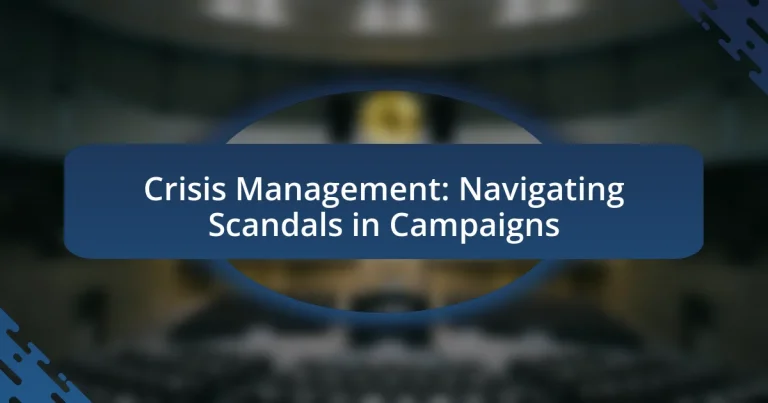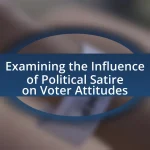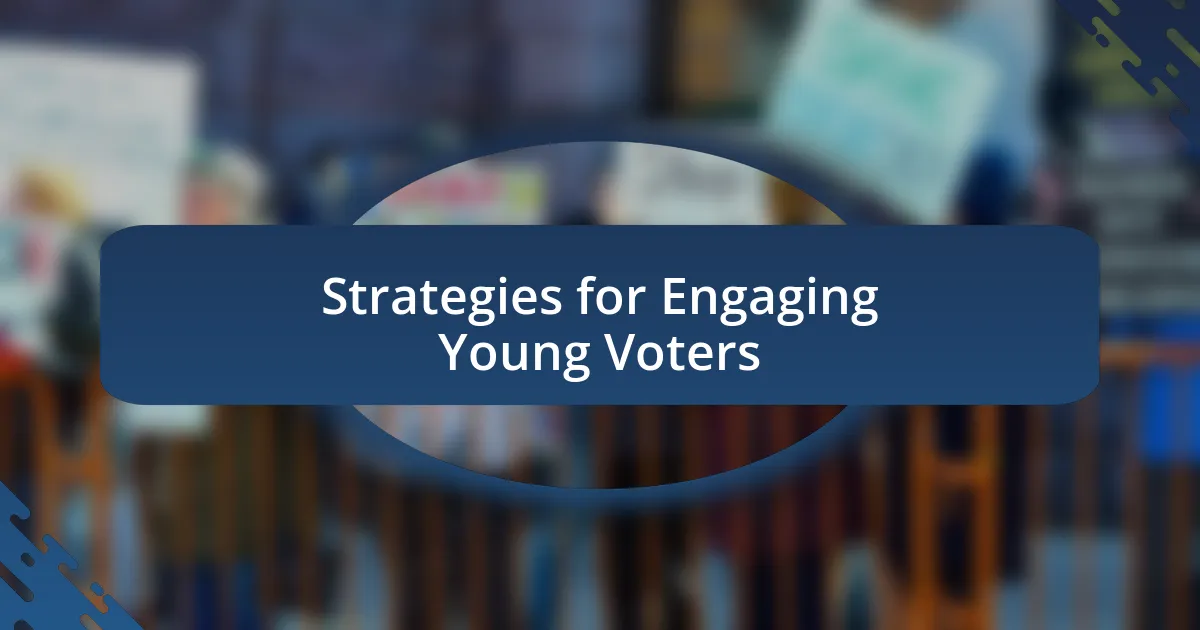Crisis management in campaigns is a strategic approach aimed at addressing and mitigating negative events or scandals that threaten the reputation and effectiveness of political campaigns. The article outlines the significance of timely communication, transparency, and strategic planning in managing crises, highlighting historical examples such as the 2016 U.S. presidential election and the 2008 Barack Obama campaign. It discusses the various types of scandals that can arise, their impact on public perception, and the essential elements of effective crisis management, including proactive measures and training. Additionally, the article emphasizes the consequences of poor crisis management and offers practical tips for campaigns to navigate scandals successfully.
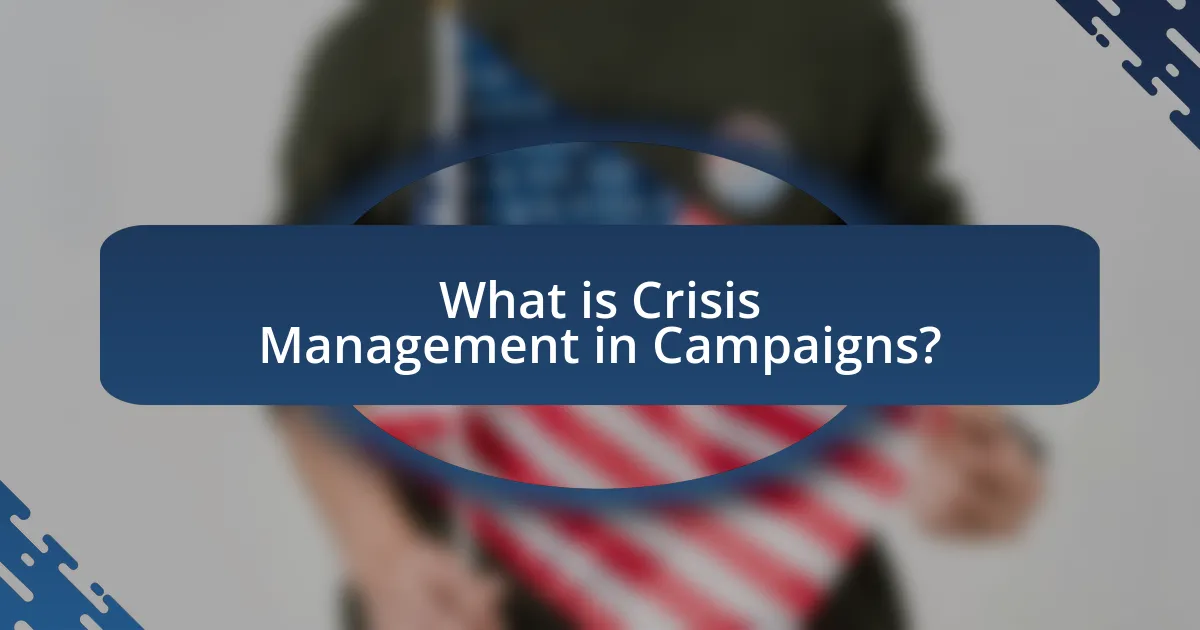
What is Crisis Management in Campaigns?
Crisis management in campaigns refers to the strategic approach taken to address and mitigate negative events or scandals that threaten the reputation and effectiveness of a political campaign. This process involves identifying potential crises, developing response strategies, and communicating effectively with stakeholders to maintain public trust. For instance, during the 2016 U.S. presidential election, the handling of controversies surrounding candidates demonstrated the importance of timely and transparent communication in crisis management, which can significantly influence voter perception and campaign outcomes.
How does Crisis Management apply to political campaigns?
Crisis management is essential in political campaigns as it helps candidates effectively respond to scandals or unexpected events that could damage their reputation. Political campaigns often face crises that can arise from various sources, including social media backlash, candidate missteps, or external attacks. For instance, during the 2008 presidential campaign, Barack Obama’s team managed a potential crisis when a controversial statement made by his pastor surfaced; they quickly addressed the issue through a public speech, which helped mitigate damage and regain public trust. Effective crisis management strategies, such as timely communication, transparency, and proactive engagement, are crucial for maintaining a candidate’s image and ensuring voter confidence during turbulent times.
What are the key elements of effective Crisis Management in campaigns?
The key elements of effective Crisis Management in campaigns include timely communication, transparency, strategic planning, and stakeholder engagement. Timely communication ensures that information is disseminated quickly to mitigate misinformation and control the narrative. Transparency builds trust with the audience, as seen in the 2016 U.S. presidential campaign when candidates who openly addressed controversies were perceived more favorably. Strategic planning involves preparing for potential crises by identifying risks and developing response strategies, which is crucial for minimizing damage. Lastly, stakeholder engagement involves actively involving key individuals and groups in the response process, ensuring that their concerns are addressed, which can lead to a more favorable outcome.
How do different types of crises impact campaign strategies?
Different types of crises significantly impact campaign strategies by necessitating tailored responses that address the specific nature of the crisis. For instance, a financial scandal may require a campaign to focus on transparency and accountability, while a personal scandal might shift the emphasis to character rehabilitation and public relations efforts. Historical examples illustrate this: during the 2008 financial crisis, political campaigns that prioritized economic recovery plans resonated more with voters, as seen in Barack Obama’s messaging, which emphasized hope and change in response to economic turmoil. Conversely, in the case of personal scandals, such as Anthony Weiner’s sexting scandal in 2011, campaigns often pivot to damage control and public apologies to mitigate backlash. Thus, the type of crisis dictates the strategic focus and messaging of a campaign, influencing voter perception and engagement.
Why is Crisis Management crucial during election campaigns?
Crisis management is crucial during election campaigns because it helps candidates effectively respond to unexpected challenges that could damage their reputation and electoral prospects. During campaigns, candidates face heightened scrutiny, and any misstep can lead to significant backlash, as evidenced by the 2016 U.S. presidential election, where various scandals influenced voter perceptions and outcomes. Effective crisis management strategies, such as timely communication and transparent actions, can mitigate negative impacts and maintain public trust, which is essential for securing votes.
What are the potential consequences of poor Crisis Management?
Poor crisis management can lead to severe reputational damage for organizations, resulting in loss of public trust and credibility. For instance, a study by the Institute for Public Relations found that 70% of organizations that mishandle crises experience long-term negative impacts on their reputation. Additionally, financial losses can occur, as companies may face decreased sales and increased costs associated with damage control efforts. Research from the Harvard Business Review indicates that organizations with poor crisis responses can see stock prices drop by an average of 20%. Furthermore, ineffective crisis management can lead to legal repercussions, including lawsuits and regulatory penalties, as seen in cases like the Volkswagen emissions scandal, which resulted in billions in fines. Overall, the consequences of poor crisis management can be extensive, affecting reputation, finances, and legal standing.
How can effective Crisis Management enhance a campaign’s reputation?
Effective crisis management can significantly enhance a campaign’s reputation by demonstrating accountability and responsiveness during challenging situations. When a campaign effectively addresses a crisis, it can rebuild trust with stakeholders and the public, showcasing its commitment to transparency and ethical standards. For instance, a study by the Institute for Public Relations found that organizations that communicate openly during a crisis can improve their reputation by up to 30%. This proactive approach not only mitigates negative perceptions but also positions the campaign as resilient and trustworthy, ultimately leading to stronger public support and loyalty.
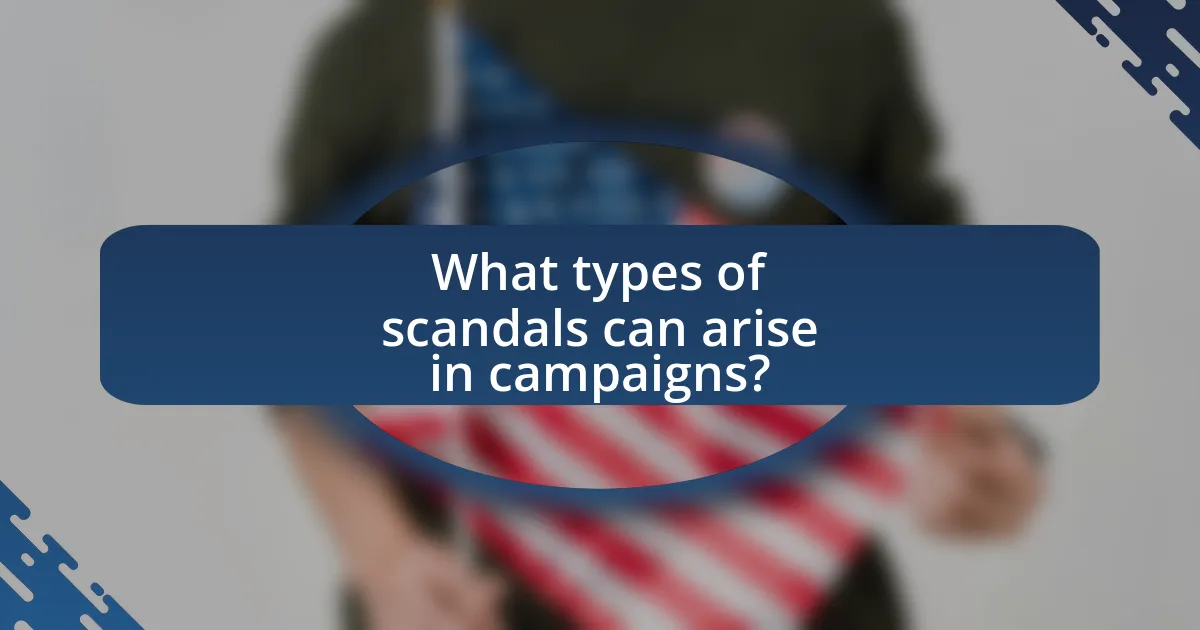
What types of scandals can arise in campaigns?
Various types of scandals can arise in campaigns, including financial misconduct, personal misconduct, and misinformation. Financial misconduct often involves illegal fundraising practices or misuse of campaign funds, which can lead to legal repercussions and loss of public trust. Personal misconduct may include allegations of infidelity, harassment, or other unethical behavior by candidates, which can damage their reputation and voter support. Misinformation scandals typically involve the spread of false information about opponents or misleading campaign promises, undermining the integrity of the electoral process. Each of these scandals can significantly impact a campaign’s success and public perception.
How do personal scandals affect candidates’ public perception?
Personal scandals significantly damage candidates’ public perception by eroding trust and credibility. When a candidate is involved in a scandal, public opinion often shifts negatively, as seen in the case of Anthony Weiner, whose sexting scandal led to a dramatic decline in his approval ratings, dropping from 60% to 30% within weeks. Scandals can overshadow a candidate’s policies and qualifications, leading voters to focus on personal failings rather than political platforms. Research indicates that 70% of voters consider personal integrity crucial when evaluating candidates, highlighting the impact of scandals on electoral outcomes.
What are some notable examples of personal scandals in recent campaigns?
Notable examples of personal scandals in recent campaigns include the 2020 presidential campaign of Joe Biden, where allegations of inappropriate behavior surfaced, and the 2016 campaign of Donald Trump, which was marked by the release of the Access Hollywood tape revealing lewd comments about women. In Biden’s case, multiple women accused him of unwanted physical contact, which he addressed publicly. Trump’s scandal involved a leaked recording where he discussed groping women, which led to widespread media coverage and backlash. Both incidents significantly impacted public perception and campaign dynamics, illustrating the profound effects personal scandals can have on political campaigns.
How can candidates mitigate the effects of personal scandals?
Candidates can mitigate the effects of personal scandals by proactively addressing the issue through transparent communication and strategic public relations efforts. By acknowledging the scandal, providing a sincere apology if warranted, and outlining steps taken to rectify the situation, candidates can rebuild trust with their constituents. Research indicates that timely and honest communication can significantly reduce negative perceptions; for instance, a study by the Pew Research Center found that 70% of voters prefer candidates who openly discuss their mistakes rather than those who remain silent. Additionally, engaging in community outreach and demonstrating a commitment to positive change can further help candidates regain public support.
What role do external factors play in campaign scandals?
External factors significantly influence campaign scandals by shaping public perception and media coverage. For instance, economic conditions, social movements, and political climate can amplify or mitigate the impact of a scandal. Research indicates that scandals occurring during economic downturns often receive heightened scrutiny, as public dissatisfaction increases (Pew Research Center, 2020). Additionally, the role of social media as an external factor cannot be overlooked; it accelerates the spread of information and misinformation, affecting how scandals are perceived and reacted to by the electorate. Thus, external factors are crucial in determining the trajectory and consequences of campaign scandals.
How do media coverage and social media influence scandal management?
Media coverage and social media significantly influence scandal management by shaping public perception and controlling the narrative surrounding the scandal. Traditional media outlets can amplify the reach of a scandal, often leading to increased scrutiny and pressure on the involved parties, while social media platforms allow for rapid dissemination of information and public discourse, which can either mitigate or exacerbate the situation. For instance, a study by the Pew Research Center found that 64% of Americans believe social media has a major impact on how news is reported, indicating its powerful role in shaping public opinion during scandals. Additionally, effective management strategies often involve timely responses through both media and social channels to address misinformation and engage with the audience directly, thereby influencing the overall outcome of the scandal management process.
What strategies can campaigns use to counteract negative external influences?
Campaigns can counteract negative external influences by implementing proactive communication strategies, engaging in transparency, and fostering community relationships. Proactive communication involves anticipating potential issues and addressing them before they escalate, which can mitigate the impact of negative narratives. Transparency builds trust with the audience, as seen in the 2016 U.S. presidential election when candidates who openly addressed controversies were often perceived more favorably. Additionally, fostering strong community relationships allows campaigns to create a supportive network that can defend against misinformation and negative press, as demonstrated by grassroots movements that effectively mobilized support during crises.
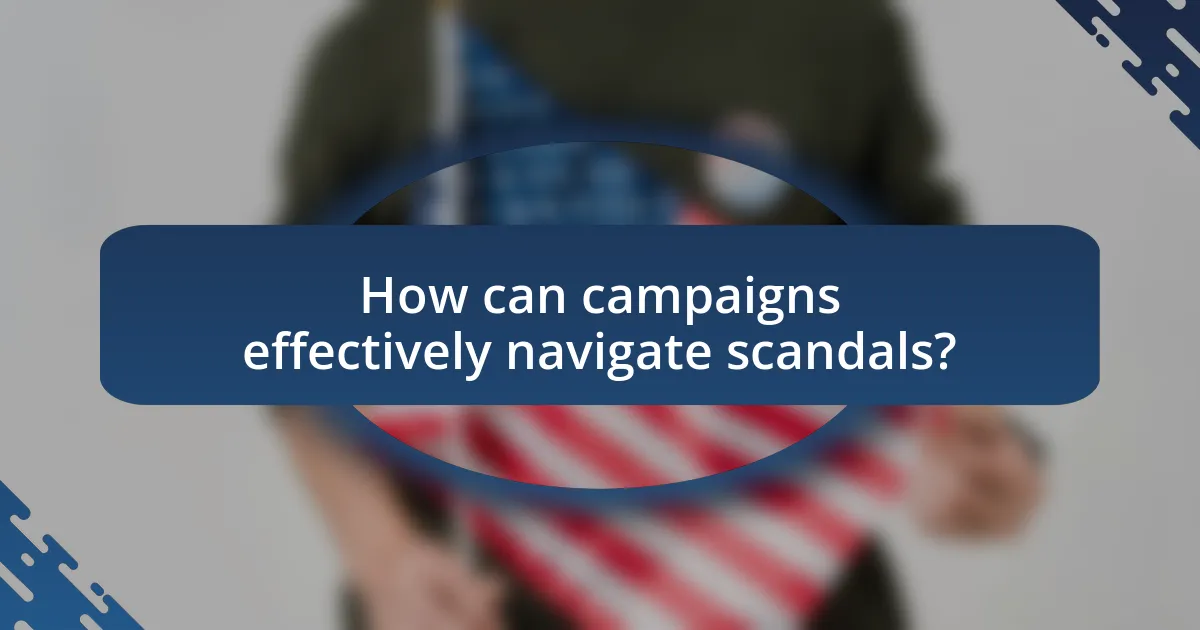
How can campaigns effectively navigate scandals?
Campaigns can effectively navigate scandals by implementing a transparent communication strategy that addresses the issue head-on. This involves promptly acknowledging the scandal, providing clear and factual information, and outlining steps being taken to rectify the situation. For instance, in 2016, the Hillary Clinton campaign faced scrutiny over her email practices; the campaign responded by holding press conferences and releasing detailed statements to clarify her actions, which helped mitigate damage. Research indicates that timely and honest communication can restore public trust, as seen in studies by the Institute for Public Relations, which highlight the importance of transparency in crisis management.
What are the best practices for responding to a scandal?
The best practices for responding to a scandal include prompt acknowledgment, transparent communication, and strategic action. Acknowledging the scandal quickly demonstrates accountability and prevents speculation. Transparent communication involves providing clear, factual information to stakeholders, which helps maintain trust. Strategic action entails implementing measures to address the issue and prevent recurrence, such as policy changes or personnel adjustments. These practices are supported by case studies, such as the response of Johnson & Johnson during the Tylenol crisis in 1982, where swift action and transparency restored public confidence.
How important is transparency in managing a scandal?
Transparency is crucial in managing a scandal as it fosters trust and credibility with stakeholders. When organizations or individuals are open about the details surrounding a scandal, they can mitigate damage by demonstrating accountability and a commitment to ethical standards. Research indicates that 70% of consumers are more likely to forgive a brand that is transparent about its mistakes, highlighting the effectiveness of transparency in restoring public confidence. Furthermore, historical examples, such as the Tylenol crisis in 1982, show that immediate and transparent communication can lead to a quicker recovery and a stronger reputation post-crisis.
What communication strategies should be employed during a crisis?
During a crisis, organizations should employ transparent communication, timely updates, and empathetic messaging. Transparent communication builds trust, as seen in the 2010 BP oil spill, where initial lack of transparency led to public outrage. Timely updates keep stakeholders informed and mitigate misinformation; for instance, during the COVID-19 pandemic, regular updates from health authorities helped manage public anxiety. Empathetic messaging acknowledges the concerns of affected individuals, which can foster a sense of community and support. These strategies collectively enhance credibility and facilitate effective crisis management.
How can campaigns prepare for potential scandals?
Campaigns can prepare for potential scandals by establishing a proactive crisis management plan that includes clear communication strategies, designated spokespersons, and rapid response protocols. This preparation allows campaigns to address issues swiftly and transparently, minimizing damage to their reputation. For instance, the 2016 U.S. presidential campaigns highlighted the importance of having a crisis team ready to respond to allegations, as seen when both major candidates faced various controversies. Research indicates that campaigns with pre-established protocols can reduce negative impacts by up to 50%, demonstrating the effectiveness of preparedness in crisis situations.
What proactive measures can be taken to minimize scandal risks?
To minimize scandal risks, organizations should implement comprehensive risk assessments and establish clear ethical guidelines. Conducting regular audits of practices and communications helps identify potential vulnerabilities, while training staff on ethical behavior reinforces a culture of accountability. For instance, a study by the Ethics Resource Center found that organizations with strong ethical cultures experience 50% fewer incidents of misconduct. Additionally, maintaining transparency with stakeholders and having a crisis communication plan in place can mitigate the impact of any emerging issues.
How can training and simulations help campaign teams in crisis situations?
Training and simulations can significantly enhance campaign teams’ preparedness in crisis situations by providing realistic scenarios that improve decision-making and communication skills. These methods allow teams to practice responses to potential crises, enabling them to identify weaknesses and develop effective strategies. For instance, a study by the Harvard Kennedy School found that organizations that engage in crisis simulations are 30% more effective in managing real crises compared to those that do not. This evidence underscores the importance of training and simulations in equipping campaign teams with the necessary tools to navigate scandals effectively.
What are the common pitfalls in Crisis Management during campaigns?
Common pitfalls in crisis management during campaigns include inadequate preparation, poor communication, and failure to adapt to evolving situations. Inadequate preparation often leads to a lack of clear protocols, resulting in disorganized responses that can exacerbate the crisis. Poor communication can create confusion and mistrust among stakeholders, as seen in the 2016 U.S. presidential election when miscommunication regarding responses to controversies led to public backlash. Additionally, failure to adapt to evolving situations can result in missed opportunities to mitigate damage, as demonstrated by companies that did not adjust their strategies in response to real-time feedback during public relations crises. These pitfalls can significantly hinder the effectiveness of crisis management efforts in campaigns.
How can campaigns avoid missteps that exacerbate scandals?
Campaigns can avoid missteps that exacerbate scandals by implementing proactive communication strategies and establishing clear protocols for crisis management. Proactive communication involves anticipating potential issues and addressing them before they escalate, which can prevent misunderstandings and misinformation. Establishing clear protocols ensures that all team members know how to respond to crises, minimizing the risk of inconsistent messaging that can worsen a scandal. For instance, the 2016 U.S. presidential campaign of Hillary Clinton faced backlash over email controversies, which could have been mitigated with a more transparent communication strategy and a well-defined crisis response plan.
What lessons can be learned from past campaign crises?
Lessons learned from past campaign crises include the importance of transparency, rapid response, and effective communication. Historical examples, such as the Watergate scandal, demonstrate that lack of transparency can lead to a loss of public trust and prolonged damage to a campaign. Additionally, the swift response to the 2008 Obama campaign’s handling of the Reverend Wright controversy illustrates that addressing issues head-on can mitigate negative impacts. Effective communication strategies, as seen in the aftermath of the 2016 U.S. presidential election, highlight the necessity of maintaining a consistent message to counter misinformation. These lessons emphasize that proactive measures and clear communication are essential in managing crises effectively.
What practical tips can campaigns implement for effective Crisis Management?
Campaigns can implement several practical tips for effective crisis management, including establishing a crisis communication plan, training spokespersons, and monitoring social media. A crisis communication plan ensures that all team members understand their roles and the messaging strategy during a crisis, which is crucial for maintaining consistency and clarity. Training spokespersons prepares them to address the media and public effectively, reducing the risk of miscommunication. Monitoring social media allows campaigns to gauge public sentiment and respond promptly to misinformation or negative narratives, which is essential for damage control. These strategies are supported by research indicating that proactive communication and preparedness significantly mitigate the impact of crises on public perception.
